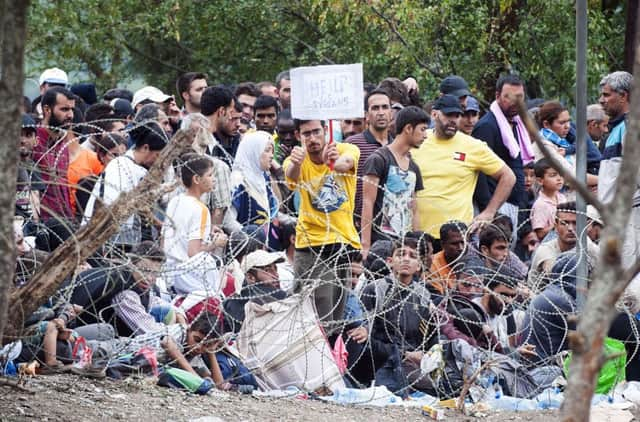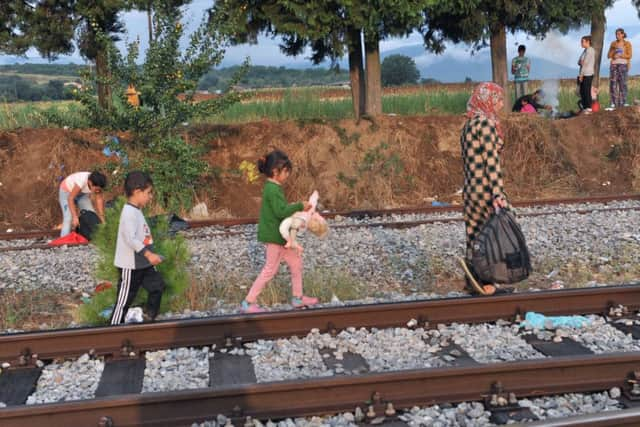Razor wire and machine-guns at Macedonia border


On Friday, police fired stun grenades and clashed with the migrants who tried to rush over the border, a day after Macedonia’s government declared a state of emergency on the frontier to stop the human tide. At least 10 people were injured in the ensuing melee.
Overnight, police allowed only small groups of families with children to cross the border by walking on railway tracks to a station in the Macedonian town of Gevgelija, where most take trains to the border with Serbia before heading further north towards EU-member Hungary.
Advertisement
Hide AdAdvertisement
Hide AdThose who could not cross spent the rainy and chilly night in the open with little food and water.


They massed close to a razor wire separating them from Macedonian policemen with machine-guns. Some raised their babies above their heads to try to persuade the policemen to let them through.
“These men are heartless,” said Yousef, a Syrian refugee who gave only his first name, as he held a little girl in his arms and pointed to the policemen. “They don’t care about our tragedy.”
As heavy rain poured down, some migrants took off their shirts and jeered at the policemen in camouflage fatigues. Others took shelter inside dozens of small tents or under a few trees on a muddy field.
Both Greece and Macedonia have seen an unprecedented wave of migrants this year, most fleeing wars in Syria, Afghanistan or Iraq. More than 160,000 have arrived so far in Greece, mostly crossing in inflatable dinghies from the nearby Turkish coast – an influx that has overwhelmed Greek authorities and the country’s small Aegean islands. Some 45,000 crossed through Macedonia over the past two months.
The country, formerly part of Yugoslavia, has declared a state of emergency to cope with the situation.
Nikola Poposki, Macedonia’s foreign minister, said the situation had “dramatically deteriorated”.
He said: “In the last several days there has been a dramatic increase of inflow of migrants and we have reached numbers of 3,000 to 3,500 per day which obviously is not something a country of two million people and our resources can handle on a daily basis.
Advertisement
Hide AdAdvertisement
Hide Ad“We had to reinforce the control of illegal entry of Macedonian territory.”
Responding to criticism, he added: “Macedonia’s definitely not a place where they [migrants and refugees] have been mistreated.”
Poposki said all migrants had to register on entering Macedonia, and they had 72 hours to decide whether they would apply for asylum or pursue their route north.
Few, if any, of the migrants want to remain in Greece, which is in the grip of a financial crisis. Most head straight to the country’s northern border with Macedonia, where they cram onto trains and head north through Serbia and Hungary on their way to the more prosperous EU countries such as Germany, the Netherlands or Sweden.
Last week, there were chaotic scenes at the Gevgelija train station as hundreds of migrants tried to board trains.
Yesterday, Rama Kabul, a Syrian, walked on the railway track in the opposite direction from the station pleading with two Macedonian policemen who were pushing her back with riot shields to let her brother – who remained trapped behind the razor fence on the border – join her.
“They took me out and left him there,” Kabul said with tears in her eyes. “I just want to talk to him.”
Macedonian police said that they started blocking the refugees on the 30-mile frontier “for the security of citizens who live in the border areas and for better treatment of the migrants”.
Advertisement
Hide AdAdvertisement
Hide AdThe UNHCR refugee agency said it is “particularly worried about the thousands of vulnerable refugees and migrants, especially women and children, now massed on the Greek side of the border amid deteriorating conditions.”
Medecins Sans Frontieres said it had treated 10 people with wounds from stun grenades fired by Macedonian troops near the Greek border village of Edomeni.
Emina Cerimovic, of Human Rights Watch, said: “Macedonian authorities should be protecting migrants, not giving the police a green light to fire at them.”
Amnesty International said the migrants had been treated more like “rioters” than refugees.